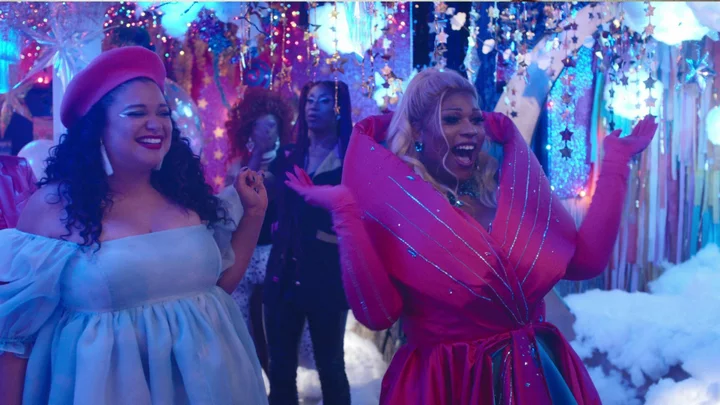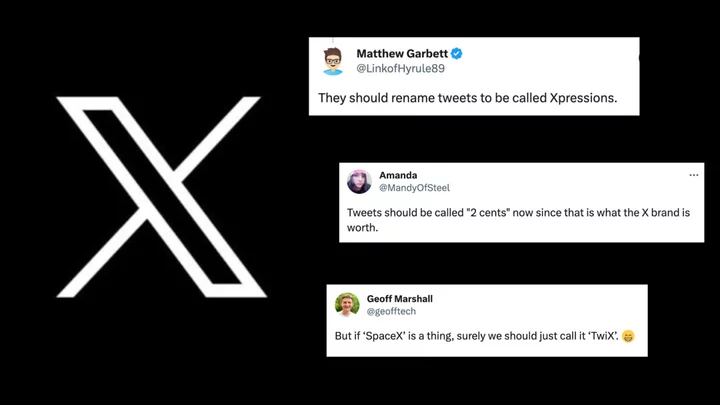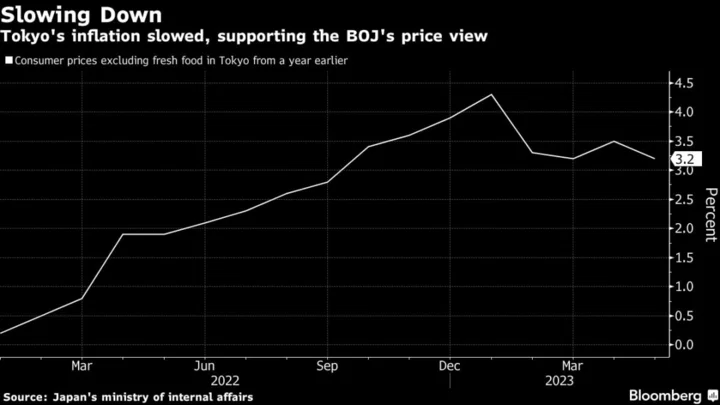Pride Month may be drawing to a close, but the celebration continues with Netflix's Survival of the Thickest. Written and created by Michelle Buteau, Netflix's new dramedy series premieres July 13 and is a brilliant celebration of queerness, Blackness, and the intersectionality of both. We sat down with Buteau's co-star, Peppermint, to talk about her career in drag, and how shows like Survival of the Thickest differ so much from the TV she grew up with.
Survival of the Thickest centers on Buteau as Mavis Beaumont, a 38-year-old Black, plus-sized stylist who bets on herself after a bad breakup. Her mission is to help clients celebrate their bodies, whatever their gender or shape. Peppermint, playing a version of herself, is one of Mavis's friends and early uplifters, hooking her up with clients at her drag bar, CC Bloom's. As part of Mavis's chosen family, Peppermint not only sets the small screen on fire but also celebrates the bonds of sisterhood.
Peppermint looks back on her drag origins.
Drag queen Peppermint attends the "RuPaul's Drag Race All Stars" meet The Queens on January 17, 2018 in New York City. Credit: Bennett Raglin/Getty ImagesWhen Peppermint began her career 30 years ago, she was doing drag in clubs and bars in New York City. In 1993, being out and proud as a queer person, let alone a trans woman, wasn't really an option. Ellen DeGeneres hadn't even come out yet, and Jerry Springer would shortly begin outing Black, trans women on national TV as some sick form of entertainment. But inside dimly lit clubs, surrounded by queer friends on the dance floor, Peppermint found safety under the spotlight.
"Drag can be really liberating," Peppermint told Mashable. But for this New Yorker, getting in a pair of heels and a sequined dress wasn't about lip-syncing. "It was to express myself in the only gender that worked for me."
While some performers become entirely different people under their personas, Peppermint used drag as a way to get closer to who she really was. "I just wanted [people to see me] through the lens of being a woman. I called it drag because that's what people were accepting."
Given the societal norms prevalent at the time, it was an understandable move. But as the years went on, Peppermint found strength in her trans identity because of drag. Little did she know that coming out on national TV as a trans woman wouldn't drag her down, but would lift her into greatness.
Peppermint made drag herstory during Season 9 of RuPaul's Drag Race, back in 2017, as the first queen to begin the competition openly trans. (Not to overlook Kylie Sonique Love and Carmen Carrera, who came out publicly after their respective seasons, and Monica Beverly Hillz, who came out during an elimination on Season 5.) When Peppermint came out to her castmates while getting ready for a runway, the reveal ignited a much-needed conversation about transness in the drag community, and how the construct of gender shouldn't limit what you can and cannot do as a performer. To understand just how different the cultural climate was by the time Peppermint came out, remember that until 2015, the show had a running gag where RuPaul would address the queens in a recurring video segment with the catchphrase "You've got she-mail."
Since becoming runner-up in Season 9, Peppermint's success has grown beyond drag. She became the first trans woman to originate a principal musical role on Broadway's Head Over Heels in 2018, and has since appeared on episodes of Pose and Schmigadoon!. She's also used her celebrity status to be an advocate for trans rights, becoming the ACLU's first-ever Artist Ambassador for Trans Justice.
Peppermint blurs the lines between drag and glam.
Michelle Buteau as Mavis, Tone Bell as Khalil, and Peppermint as Peppermint in "Survival of the Thickest." Credit: Vanessa Clifton/NetflixAll to say, Peppermint isn't just a drag queen. She has always been, and always will be, a performer at heart, even when not portraying her onstage persona. But when you catch her in Survival of the Thickest next month, alongside the fabulous Buteau, you may be finding yourself wondering, if she's in the show as Peppermint, is she in drag?
"Even people who knew me before I was ever doing drag call me Peppermint," she explains. It's a moniker that represents both sides of herself — the artist in the spotlight and the person navigating a private life offstage. Going by the same name while both in and out of drag is a remarkable blurring of the lines between glam and drag, and at the end of the day, it doesn't really matter. "When you're in high glam, there's almost no difference [to drag]," she continues.
"You have the same undergarments. You got the Spanx, the lashes, the glitter. You got all the things. And it's just as dramatic, especially these days where drag makeup, drag technique, and drag aesthetics have been brought into mainstream beauty. The Kardashians [are] getting their lips super plump, and then telling everybody to contour when they go to the grocery store."
This mainstream migration of cultural touchstones once siloed in queer communities, like contour techniques perfected over the years by drag queens, can be linked to the expansion of queerness throughout the world of entertainment. A world that, in recent years, has grown beyond belief.
"There's a million and one options and places where people can find [queer content]," Peppermint shared. But she recalled when those options were much more limited. "I remember watching Melrose Place, and they were advertising, 'There's going to be a gay kiss, a gay moment, tune in for this.' And [we did], but they got cold feet, so when these two guys went in for a kiss, they cut to someone looking shocked. They didn't show the kiss, but they inferred it. And it was like, 'Oh, God. That's what we get. There's our crumbs.'"
Even though they never showed the kiss on Melrose Place, it was still a scandal. And it was those kinds of scandals that paved the way for the type of entertainment we have today.
"It's incredible to see such a wide array of shows that include queer stories," Peppermint said. "Maybe not necessarily queer-centric shows, because there's still a growing amount of those, but even then, it's mind-boggling to know that there are so many queer stories you don't even know about happening on TV these days."
SEE ALSO: 39 binge-worthy LGBTQ TV shows to watch this PridePeppermint wants you to examine capitalism.
Peppermint as Peppermint and Michelle Buteau as Mavis in "Survival of the Thickest." Credit: Vanessa Clifton/NetflixWhile there is greater queer representation on TV, the LGBTQ community is still under attack. Notably, the trans community has been subject to a growing number of anti-trans bills aimed at making everything from transitioning to existing while trans harder.
"We are facing a series of attacks that have several prongs, and have many different levels and layers," Peppermint said of this political battle. "People need to find a way to connect with a leftist, not democratic, ideology that can examine capitalism."
SEE ALSO: Bills that attack transgender people don't keep anyone safe"I know, I'm in entertainment. There's almost nothing more capitalist than that," Peppermint continued. "But when we're talking about the rights of marginalized identities, people being legislated against in droves, [being fed] lies and propaganda, all to sell and cement [bigoted] laws and policies into place, then we have to look at the structure we have, which is capitalism, and this patriarchy [that works hand-in-hand].
"We need to examine those things, and how we fit into them. We get all up in arms about something Beyoncé is doing on her new album or concert, but then don't say anything about trans rights when our laws are being stricken down state by state by state."
Drag was how Peppermint found herself and found fame. Now, she's using that platform to advocate for her community.
"The gift of gay rights and equality is not going to be something that's just tweeted to you overnight," she said. "You have to actually do the work. Whether that means voting, whether that means marching, whether that means speaking with your family incessantly. It doesn't necessarily mean fighting, but leading with empathy and availing yourself of new content that isn't just fed to you by whatever [algorithm] you’re on."









